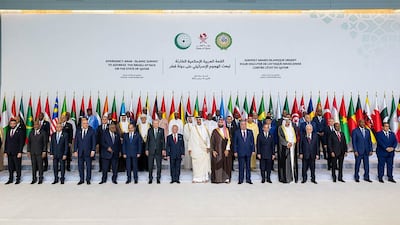On June 22, Israeli Prime Minister Benjamin Netanyahu delivered a speech praising his country’s wave of air strikes against Iran. “Two days after the war began, I said: ‘We will change the face of the Middle East’,” Mr Netanyahu stated. “That is exactly what we are doing. Even if difficult days lie ahead, with God’s help, we will see days of greatness, unity, power – and peace.”
It is true that the region is changing, but not in the way Mr Netanyahu may have had in mind.
On Monday, Arab and Muslim nations – representing a diversity of views and priorities – came together in Doha. With one voice, they condemned last week’s Israeli air strike on the Qatari capital, called for a halt to the war on Gaza and warned that Israeli policies of starvation and annexation were undermining “any chance of achieving peace in the region”.
Indeed, “peace” was a recurring theme in Doha, with the word appearing no fewer than 17 times in the emergency summit’s final declaration. This communique joins other significant examples of Arab and Muslim outreach regarding a better future for the Middle East. These include the Arab Peace Initiative, first endorsed in 2002, which offers Israel normalisation in return for a just settlement with the Palestinians.
More recently, the July 29 New York Declaration at the UN offered “tangible steps in promoting mutual recognition, peaceful coexistence and co-operation among all States in the region” as well as condemning the October 7, 2023, Hamas-led attacks against civilians.
It is difficult not to compare the settled, public position of much of the Arab and Muslim world’s leaders – normalisation and engagement in return for peace – with the kind of statements coming from those in positions of authority in Israel. “Gaza is burning,” the country’s Defence Minister Israel Katz wrote on X yesterday after heavy air strikes pounded Gaza city. A day before, Mr Netanyahu, standing beside US Secretary of State Marco Rubio at a news conference in Jerusalem, was unmoved when asked about the Doha strike and did not rule out further attacks on Hamas leaders “wherever they are”. Meanwhile, Israeli forces continue to occupy and bombard parts of Lebanon and Syria.
Israel may believe that it can ignore Arab-led peace initiatives, with supportive visits such as Mr Rubio’s this week seemingly buttressing the Israeli leadership’s decision to put all its security eggs in one US basket. But Mr Rubio has acknowledged the critical role Arab states continue to play in shaping the region’s future – including that of Israel. On Tuesday, Mr Rubio departed Israel to travel to Doha, where he said that “if there’s any country in the world that could help end [the Gaza war] through a negotiation, it’s Qatar”.
For Israel, therefore, ignoring Arab concerns – many of which are echoed by the international community – is very risky. A sense of international and regional estrangement may even be getting through. On Monday, Israeli media quoted Mr Netanyahu speaking at a Finance Ministry conference where he admitted the country was “entering a kind of isolation, and we will have to increasingly adjust to an economy with characteristics of self-sufficiency”. His remarks were followed by a dip on the Tel Aviv stock exchange.
On Friday, the UN General Assembly approved the French-Saudi proposal on building a two-state solution to the Palestine-Israel conflict. There is less than one week until France and Saudi Arabia lead another high-level conference on the issue in New York. It would be naive to expect Israel’s leadership to change course in the coming few days, but when confronted by dozens of neighbours – some of whom are treaty partners – meeting in Doha and its own Prime Minister acknowledging that its economy is now at risk, the country is watching its non-US alliances fray and its isolation becomes more profound. Israel’s policy of using violence to respond to all developments has led it into a dead end – and the way out is clear for those with the vision to see it.



